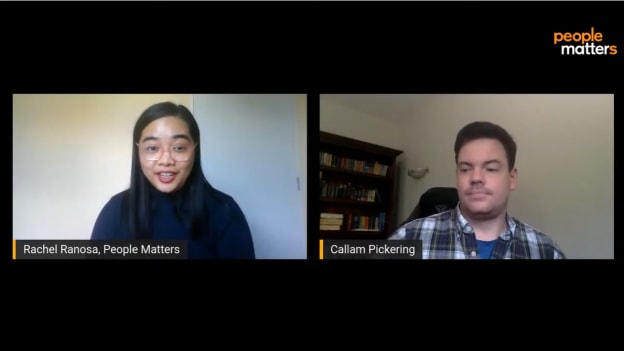Navigating the recruitment landscape in Singapore in 2022

Recruitment is an urgent part of any company’s growth strategy and finding the right talent is no easy task. With the economic recovery of Singapore in full swing, a number of questions remain for recruiters in the talent hunt. With the intention to aid talent leaders in their endeavour to create impactful hiring strategies, People Matters in partnership with Indeed recently hosted a fascinating webinar session led by Callam Pickering, APAC Economist at Indeed who delved into the latest trends in the Singapore labour market.
‘We expect the Singapore labour market to tighten in 2022. With the unemployment rate falling further, due to strong job creation across most industries and occupations, the biggest challenge besides dealing with COVID, of course, is the need to boost immigration to help Singapore businesses deal with skill shortages and recruitment difficulties. And those difficulties have become exacerbated over the course of 2021. And we anticipate that they could become a little bit worse over the course of 2022,’ points out Callam as he opens the webinar session.
Key Trends on the impact of the pandemic on employment in Singapore:
Singapore's population has fallen for the past two years by a total of 4.4%. And it's now found to be at its lowest level in eight years. So the decline in the past two years has completely offset the population growth that we saw in the preceding six years and this raises a key question on the employment front. Recruiters are looking for answers on how quickly Singapore can turn this trend around because answering this question will determine the country’s economic performance over the next few years.
As highlighted by Callam, ‘It will be difficult for the Singapore economy to grow at a strong rate through the years unless immigration flows begin to return the population to a stage that resembles normal. Now, due to the decline in population, Singapore's unemployment rate has remained low throughout the pandemic, contributing to the skill shortages that have become increasingly common.’
In the past few years employment outcomes for Singapore residents have varied considerably by education. Those with university degrees have fantastic employment prospects, which is evident in how every booming industry in Singapore has a high concentration of university graduates.
Employment outcomes for people with deployments or other professional qualifications has been quite strong as well. But for those residents with a secondary educational wallet, it has been a pretty tough job market and it remains that way. Most of the struggling or mixed industries have a large cohort of workers without formal tertiary qualifications.
Overall, the Singapore economy is now 3.6% larger than it was before the pandemic again. The expectations for 2022 suggests that the country would be looking at growth mode in the 3 to 5% range.
Boom in employment activity, struggle for recruiters ensues:
‘The combination of record recruitment on one hand, and a falling population on the other is far from ideal for recruiters. It is a recipe for hiring difficulties, skill shortages, and creates a more difficult recruitment environment, particularly for businesses that rely on overseas talent,’ highlights Callam.
With an ageing population, immigration may become even more significant for Singapore’s long term economic success.
Rise in remote work opportunities:
Regarding the post-pandemic workplace, Callam speculates that a hybrid model will be the future. ‘The rise in remote work opportunities has been matched by job seeking interest. By the end of January, 2.9% of searches on Indeed were for remote jobs. That's one in every 34 searches. It's also 3.8 times higher than was normal before the pandemic again. Now, 2.9% of searches might not seem like a lot, until you remember that there are means of different search terms that jobseekers can use to find a job. Remote work is consistently among the most popular search terms and that certainly wasn't true before the pandemic,’ he says.
Vaccination becomes a mandatory requirement for employment:
By the end of January, 3.5% of job postings featured references to vaccine requirements in the job descriptions. It has doubled in the past four months, and is about five times higher than a year ago. There’s also going to be a number of jobs where vaccination status will be considered, but that information won’t be explicitly included in the job description. Given Singapore is a high vaccination country, there will be a lot of businesses that would simply assume that those applying have been vaccinated and wouldn't ask explicitly about that until they get to the final stage of hiring.
Singapore’s high growth technology sector:
Software development is now the second largest occupational category in Singapore behind management roles. There is high demand for tech talent and the industry continues to be one of the most exciting and fastest growing in the country. But there is often a mismatch between the skills demanded by employers and the skills on offer from job seekers. Traditionally, that has been addressed through skilled migration but recently, not so much. The tech sector is more susceptible to skill shortages. This is primarily because the skills and demand is changing rapidly in light of the accelerated digital transformation.
Strategies to steer through this uncertainty in hiring:
One of the first steps advised by Callam is higher pay and better benefits, this would be fundamental to attracting and retaining talent. Secondly, searching for candidates more broadly and this expansion of the talent pool could be inclusive of geographical factors, work arrangements and even qualifications. This can help override the artificial barrier often created in the hunt for talent and in a tight labour market, it makes sense to review those requirements. Thirdly, organisations can invest more on internal training to upskill the existing talent in the capabilities they actively seek.
‘A tight labour market breeds innovation, and a greater emphasis on creating more productive work processes. Investing in new technology, or restructuring teams can help a business work around an inability to fill a particular particular role,’ advises Callam.
To watch the full session and gain more in-depth access to the key trends and actionable insights shared by Callam, click here.
















